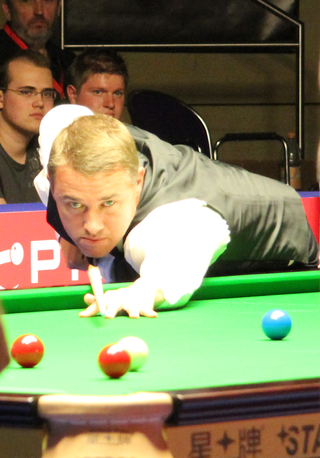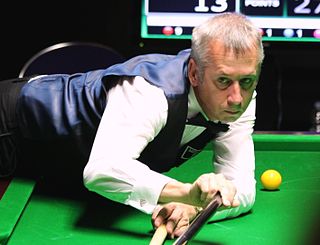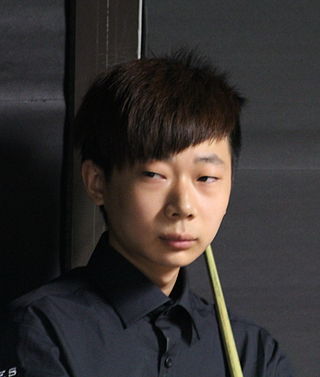
Ken Doherty is an Irish professional snooker player from Ranelagh in Dublin. He has won six ranking titles and was World Snooker Champion in 1997. In addition to his ongoing playing career, he works as a regular commentator and pundit on televised snooker broadcasts.

Stephen Gordon Hendry is a Scottish retired professional snooker player and a current commentator and pundit. One of the most successful players in snooker history, he turned professional in 1985, aged 16, and rose rapidly through the snooker world rankings, reaching number four in the world by the end of his third professional season. He won his first World Snooker Championship in 1990, aged 21 years and 106 days, making him the sport's youngest world champion, a record he still holds. He won seven world titles between 1990 and 1999, setting a new modern-era record that stood outright until Ronnie O'Sullivan equalled it in 2022. He also won the Masters six times and the UK Championship five times for a career total of 18 Triple Crown tournament wins, a total exceeded only by O'Sullivan's 23. His total of 36 ranking titles is second only to O'Sullivan's 41, while his nine seasons as world number one were the most by any player under the annual ranking system used until 2010.
Joe Johnson is an English former professional snooker player and snooker commentator for Eurosport. He became the British under-19 champion in 1971 as an amateur, defeating Tony Knowles in the final. After reaching the finals of the 1978 English Amateur Championship and the 1978 World Amateur Championship, Johnson turned professional in 1979. He reached his first ranking final at the 1983 Professional Players Tournament, and reached the semi-finals of the 1985 Classic.

Clifford Charles Devlin Thorburn is a Canadian retired professional snooker player. Nicknamed "The Grinder" because of his slow, determined style of play, he won the World Snooker Championship in 1980, defeating Alex Higgins 18–16 in the final. He is generally recognised as the sport's first world champion from outside the United Kingdom—since Australian Horace Lindrum's 1952 title is usually disregarded—and he remains the only world champion from the Americas. He was runner-up in two other world championships, losing 21–25 to John Spencer in the 1977 final and 6–18 to Steve Davis in the 1983 final. At the 1983 tournament, Thorburn became the first player to make a maximum break in a World Championship match, achieving the feat in his second-round encounter with Terry Griffiths.

Nigel Bond is an English retired professional snooker player.

Robin Hull is a Finnish former professional snooker player.

Gerard Eamonn Greene is a Northern Irish former professional snooker player. He represents Northern Ireland in international events, as his parents are from Belfast.
The 1986 World Snooker Championship was a professional snooker tournament that took place between 19 April and 5 May 1986 at the Crucible Theatre in Sheffield, England. It was the sixth and final ranking event of the 1985–86 snooker season and the 1986 edition of the World Snooker Championship, first held in 1927. The total prize fund was £350,000 with £70,000 awarded to the winner and was sponsored by cigarette manufacturer Embassy.
The 1988 World Snooker Championship, also known as the 1988 Embassy World Snooker Championship for sponsorship reasons, was a professional snooker tournament that took place from 16 April to 2 May 1988 at the Crucible Theatre in Sheffield, England. Organised by the World Professional Billiards and Snooker Association (WPBSA), it was the sixth and final ranking event of the 1987–88 snooker season and the twelfth consecutive World Snooker Championship to be held at the Crucible, the first tournament there having taken place in 1977.
The 1983 World Snooker Championship was a professional snooker tournament that took place between 16 April and 2 May 1983 at the Crucible Theatre in Sheffield, England. This was the third and final world ranking event of the 1982–83 snooker season following the 1982 Professional Players Tournament. Sixteen seeded players qualified directly for the event, with an additional sixteen players progressing through a two-round qualification round held at the Romiley Forum in Stockport, and Redwood Lodge in Bristol. The winner of the event received £30,000, and the tournament was sponsored by cigarette company Embassy.
The 1981 World Snooker Championship was a ranking professional snooker tournament which took place from 7 April to 20 April 1981 at the Crucible Theatre in Sheffield, England. The tournament was the 1981 edition of the World Snooker Championship, and was the fifth consecutive world championship to take place at the Crucible Theatre since 1977. It was sanctioned by the World Professional Billiards and Snooker Association. The total prize fund for the tournament was £75,000, of which £20,000 went to the winner.
The 1980 World Snooker Championship, officially known as the 1980 Embassy World Snooker Championship for sponsorship reasons, was a ranking professional snooker tournament that took place from 22 April to 5 May 1980 at the Crucible Theatre in Sheffield, England. The tournament was the 1980 edition of the World Snooker Championship and was the fourth consecutive world championship to take place at the Crucible Theatre since 1977. It was authorised by the World Professional Billiards and Snooker Association. The total prize fund for the tournament was £60,000, of which £15,000 went to the winner.
The 1977 World Snooker Championship is a professional snooker tournament that took place from 18 to 30 April 1977 at the Crucible Theatre in Sheffield. John Spencer won his third World Snooker Championship title by defeating Cliff Thorburn by 25 frames to 21 in the final. It was the first time the championship was held at the Crucible, which has remained as the venue for the Championship. The tournament was sponsored by cigarette manufacturer Embassy.
The 1990 World Snooker Championship was a professional snooker tournament that took place between 13 and 29 April 1990 at the Crucible Theatre in Sheffield, England. It was the ninth and final world ranking tournament of the 1989–90 snooker season following the European Open. Featuring a total prize fund of £620,000, the winner received £120,000; and was sponsored by cigarette manufacturer Embassy.
Patrick Wallace is a former professional snooker player from Dungannon in Northern Ireland. During his career, which lasted seventeen years from 1994 to 2011, he won two non-ranking titles and was a quarter-finalist in the 2001 World Championship.
John Campbell is a former Australian professional snooker player. During a career which lasted from 1982 to 1993, he was a quarter-finalist in the 1983 Professional Players Tournament, and won the Australian Professional Championship in 1985 and 1988.

Lyu Haotian is a Chinese professional snooker player, notable for being one of the youngest snooker players to have played in professional tournaments, aged only 14. He reached the quarter-finals of the 2012 International Championship when he was aged 14, which is still the record in a ranking event.
David McLellan is a Scottish former professional snooker player.
Phaitoon Phonbun is a Thai former professional snooker player.
Robert Marshall is an English former professional snooker player.






